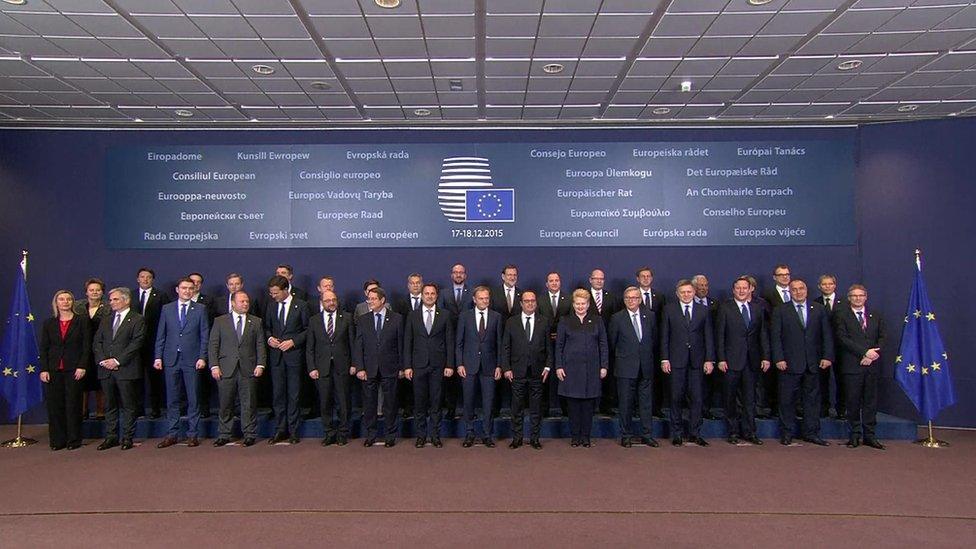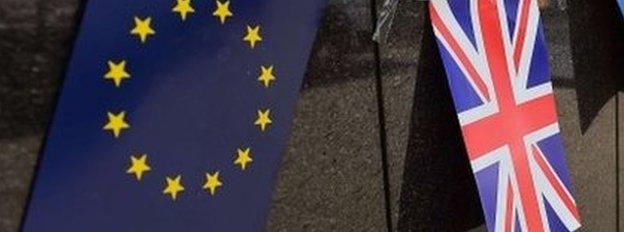EU renegotiations: David Cameron urges 'flexibility' from leaders
- Published
- comments
Cameron hopes to raise Britain's concerns about membership in the EU
David Cameron has urged EU leaders to show "flexibility" and "work together" to help him reduce migration numbers.
The PM said "unprecedented" levels of immigration were "undermining support for the European Union" in the UK.
He presented his bid to reform the EU for over half-an-hour at dinner at the European Council summit in Brussels.
European Council president Donald Tusk said the talks were "substantive and constructive" and represented a "make of break moment".
Mr Tusk said Mr Cameron set out his position, especially on benefits and free movement.
He added that leaders voiced concern but were willing to look for compromises.
German Chancellor Angela Merkel said: "I am optimistic because we all want a compromise. But work on substance needs to be done. Treaty change might be possible. Not now but perhaps later."
French President Francois Hollande said there could be adjustments over Mr Cameron's demands but EU rules and principles must be respected.
Senior officials have cast doubt on Mr Cameron's chances of agreement on his key proposal to curb in-work benefits for EU migrants to the UK for four years.
European Council President Donald Tusk earlier said some of his demands seemed unacceptable, while European Commission President Jean Claude Juncker was looking for "other options".
Also on the agenda at the EU Council meeting will be the migrant crisis, climate change and the fight against terrorism.
Mr Cameron wants to get a new deal for the UK before putting its membership to an in/out referendum by the end of 2017.
'Trust undermined'
BBC political editor Laura Kuenssberg said the prime minister had not been able to "find many friends" at the summit so far, describing the talks over dinner as a "pretty intense session".
Downing Street said he would tell his counterparts migration was putting pressure on communities and public services and was a "major concern of the British people".
"We need to find an effective answer to this problem," Mr Cameron said.
"Countries need flexibility so they can make changes to their welfare systems to better manage migration."
Mr Cameron said British people's fear "that they will be taken against their will into a political project" had "undermined British public trust in the EU for a number of years".

European heads of state and government posed for a 'family photograph' at the Brussels summit
He added: "Are we going to find the flexibility to address the concerns of the UK and work together to fix this?"
Thursday's discussions over dinner are the first time EU leaders have discussed Mr Cameron's reform proposals in detail.
He also wants protection for countries outside the eurozone, measures to boost competitiveness and an exemption for Britain from the drive towards an "ever-closer union".
Earlier Mr Cameron said the Referendum Bill had received Royal Assent, meaning the UK vote would definitely take place by the end of 2017, and said he was "pushing for real momentum" rather than striking a final deal at the summit.
He said he would be "battling hard for Britain, right through the night".
'Highly complicated'
Mr Tusk, who said he wanted "no taboos" in talks with Mr Cameron, said: "The consultations I have led with all member states show goodwill of all the parties involved, but it doesn't change the fact that some parts of the British proposal seem unacceptable.
"However, if Prime Minister Cameron persuades leaders tonight that we can work together to find solutions regarding all four baskets, then we will have a real chance to strike a deal in February."
Mr Juncker said he wanted a "fair deal with Britain".
He said: "The commission is ready to look for other options than the single one [the benefits cap] proposed by the British prime minister and I'm quite convinced that we will find a solution to that highly complicated question."
Arriving at the summit, German Chancellor Angela Merkel said: "From the German point of view, I will hold the debate in the spirit that we would like to keep Britain in the European Union but at the same time do not want to limit the basic liberties, non-discrimination, free movement, of the European Union."
'Charade'
Poland, Hungary, Slovakia and the Czech Republic have issued a joint statement saying they will reject any UK demand that is discriminatory or limits free movement.
Eurosceptics have dismissed the PM's reform demands as "trivial", with UKIP leader Nigel Farage said the talks were a "charade".
Labour, which wants Britain to remain in the EU, said the prime minister had "botched his negotiations with European leaders".
Labour leader Jeremy Corbyn, who attended a meeting of the Party of European Socialists parliamentary bloc, said the renegotiation would not succeed.
He said: "They're not going to be able to make a deal on benefits as I see it, because it would be discriminatory."

UK's EU referendum in-depth
